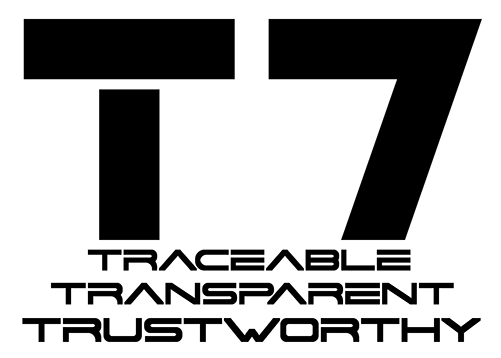T7
About T7 Workshop Format Detailed Schedule Abstracts Mailing List Register Now
Workshop on Provenance for Transparent Research
The public and the press already expect to assess the trustworthiness of research relevant to pressing social and public health issues in terms of transparency. While widely recognized as a critical component of research reproducibility in principle, the promise of making research fully transparent—and scientific claims easier to evaluate—via reliable provenance has yet to be realized in full. In particular, it is still far from routine for researchers in the natural, social, and data sciences to assess the trustworthiness of reported results using automatically captured provenance information.
This workshop aims to engage Provenance Week 2021 attendees in a focused conversation about how methods for automated provenance capture, storage, query, inference, and visualization can make research more transparent and the trustworthiness of results easier to evaluate, both by other researchers and by the public.
In brief presentations speakers will propose actionable definitions of terms such as transparent, trustworthy, and traceable; identify needs of research communities and other stakeholders; prioritize desiderata for real-world system implementations; and highlight remaining challenges.
Everyone who attends the T7 Workshop is considered a participant. All attendees will be invited to comment and contribute their own definitions, priorities, and requirements in real time. The suggestions will be ranked both by generality across research domains and specificity to particular domains. The resulting recommendations and rankings will be included in a workshop report.
We ask that everyone planning to attend please read the Instructions for All T7 Workshop Participants to make the workshop as productive as possible.
Seven T-Words: Principles of Transparent Research
A central aim of the workshop is to move beyond the debates around the R-words (reproducible, replicable, repeatable, etc) to focus on the elements of excellent research that the R-words ultimately represent and that automated provenance management can help deliver:
- Trustworthy publications, results, and recommendations
- Transparent research processes that facilitate review and assessment
- True records of the methods and processes yielding research artifacts
- Traceable derivation lineages of individual data products
- Trials demonstrated to rigorously enact well-defined study designs
- Tests of hypotheses, protocols, and conclusions that are readily reviewed
- Timely application of research outcomes to address pressing problems
Suggested Themes for Presentation and Discussion
- Significance of research transparency in addressing 21st-century existential threats
- Actionable definitions of transparency, traceability, and related T-words
- R-words meet T-words: how reproducibility enables transparency and vice versa
- Transparent research objects: standards and interoperability
- Provenance in support of FATE and FAIR principles
- Needles in a haystack–querying and visualizing lineages of particular research products
- What can I ask? Vocabularies and query languages for delivering traceability
- Attachment issues. Associating domain-specific concepts with computational artifacts
- Unsolved problems and other opportunities for collaboration and funding
Keynote Speaker
We are pleased to announce Lars Vilhuber as keynote speaker for the T7 workshop. Dr. Vilhuber is Executive Director of the Labor Dynamics Institute and Senior Research Associate in the ILR School at Cornell University. He serves as Data Editor for the American Economic Association where he has been central to the implementation of policies and procedures for verification of the reproducibility of computational research published in AEA journals. Dr. Vilhuber is also Managing Editor of the Journal of Privacy and Confidentiality, Chair of the American Statistical Association’s Committee on Privacy and Confidentiality, and member of various boards of restricted-access data centers, giving him great insight into the challenges and advantages of transparent and reproducible science.
In his talk “Principles of Transparent Research: Implementation Challenges” he will discuss the role of journal reproducibility checks in improving research transparency as well as the many challenges faced in implementation.
Workshop Format
T7 will be held Thursday, July 22, 2021 and will be fully Zoom-based for worldwide participation. Speakers will make brief presentations in support of the insights they share. All participants will propose issues, definitions, desiderata, and success criteria via Zoom chat. Zoom polls will be used to score and rank these contributions anonymously.
For more information about the workshop format please see the Instructions for All T7 Workshop Participants and the detailed T7 Workshop Agenda.
Call for Abstracts
We invite submissions of 1-page abstracts on topics relevant to the workshop. Abstracts should highlight key points the speaker plans to submit to the audience for discussion and ranking. To submit an abstract please select the Workshop on Provenance for Transparent Research track in EasyChair.
Important Dates
- T7 Abstract Submission: May 31st, 2021
- T7 Speaker Notification: June 14th, 2021
- Provenance Week: July 19-22, 2021
- T7 Convenes: July 22, 2021 (Thursday)
Organizers
- Tim McPhillips (
UIUC ) - Bertram Ludaescher (
UIUC ) - Carole Goble (
University of Manchester ) - Craig Willis (
UIUC ) - Shawn Bowers (
Gonzaga University )
Be Informed
We encourage everyone to subscribe to the T7 mailing list to learn when registration opens and to receive other updates by email.
More Information
We ask that everyone who plans to attend to please read the Instructions for All T7 Workshop Participants carefully.
Please contact Tim McPhillips with any questions.
